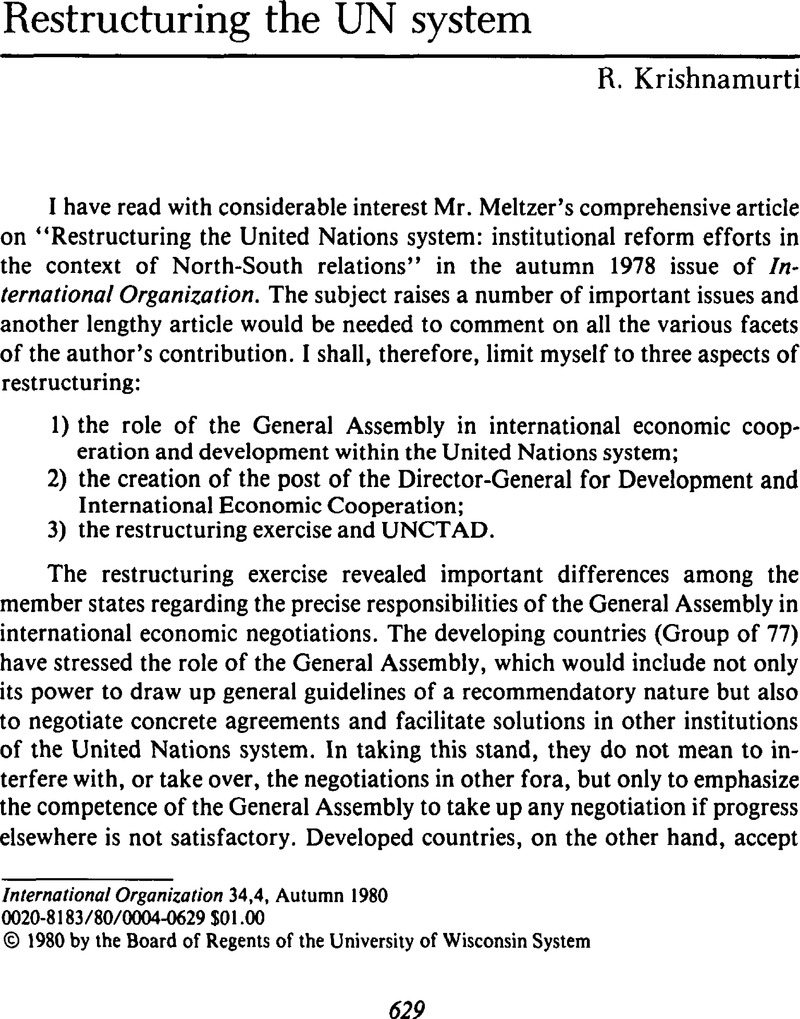Article contents
Restructuring the UN system
Published online by Cambridge University Press: 22 May 2009
Abstract

- Type
- Comments
- Information
- Copyright
- Copyright © The IO Foundation 1980
References
1 Report of the Ad Hoc Committee on the Restructuring of the Economic and Social Sectors of the United Nations System, General Assembly, 32nd Session, Supplement No. 34 (A/32/34), pp. 41–2.
2 Op. cit., p. 49.
3 Op. cit., p. 49–50.
4 One delegation, India, said that there had been very little progress in the direction of the NIEO, and in that context the recommendations of the Ad Hoc Committee were “either premature or unrealistic,” and the results were “irrelevant” in the context of the NIEO (Doc. A/32/34, p. 47).
5 See Report of the Committee established under General Assembly Resolution 32/174,1 doc. supplement no. 34 (A/33/34); also resolution 33/2 on the Report of the Committee, adopted by the Assembly.
6 See in this connection Gardner's, Mr. views in The Global Partnership (1978)Google Scholar: “With this in mind we will begin drafting a ‘grand design’ for the consolidation of U.N. economic activities. The central element in such design would be the establishment of a Director-General for Economic Affairs. Such an officer would be superior in rank to all but the Secretary-General himself. He would relieve the Secretary-General of responsibility for supervising economic functions, a responsibility which no Secretary-General has been able to perform successfully, given the pressure of his political duties. The Director-General, at the very least, would have administrative authority over the headquarters secretariat, UNCTAD, and UNIDO. Eventually, UN Members might agree on far-reaching constitutional changes which would give him real authority in relation to the specialized agencies.
There would be problems, of course, in such a centralization of authority. It may be difficult to find one man in whose hands the developed and less developed countries would be prepared to place such vast power. For the immediate future, we may have to move toward consolidation in small steps. The recent creation of the office of Under-Secretary for Interagency Affairs may prove to be one such useful step, but it is too early to predict the results.”
7 Resolution 33/202, section IV, paragraph 5 (c) reads as follow: The Director-General, under the direction of the Secretary-General, should have full and effective authority over all services and organs within the United Nations at the level of the secretariats in the economic and social sectors, without prejudice to their respective spheres of competence or the terms of reference as contained in their relevant legislative mandates, in discharging the functions envisaged in paragraph 64 (b) of the annex to General Assembly resolution 32/197, and in carrying out, inter alia, the specific tasks assigned to him by the General Assembly and the Economic and Social Council and, inter alia, in establishing the policy guidelines for all activities undertaken by those services and organs in order to ensure their coherence, coordination and efficient management. It will be noted that this paragraph does not apply to specialized agencies.
8 Report by the Secretary-General of UNCTAD, Restructuring the international economic framework (TD/221) and Measures to enable UNCTAD to carry out its role effectively, doc. TD/245, para. 27.
9 Document TD(V)NGI/CRP.5. Group B on behalf of the Western States presented its proposal (TD(V)/NGl/CRP.l). This contained a number of suggestions to streamline and rationalize UNCTAD's activities including its meetings, volume of documentation, etc., aimed at the more effective use of its financial resources and intergovernmental machinery, and called for the setting up of an intergovernmental group in UNCTAD to deal with these issues. Many of these suggestions were accepted by the Conference.
10 Document TD/L. 184.
- 1
- Cited by




